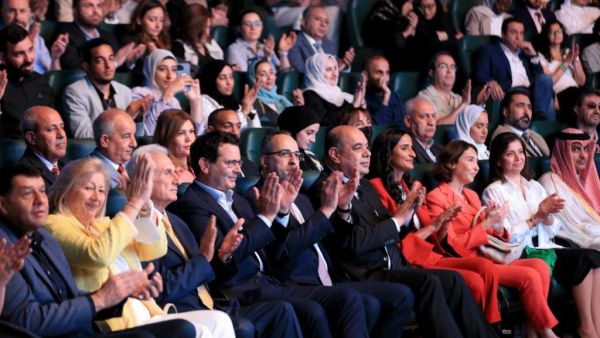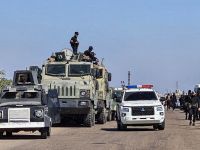TEDinarabic Speakers Emphasize The Need To Unlock Human Potential At Second Regional Event In Jordan

The importance of harnessing human potential to solve global challenges has been emphasized at the second regional event to take place under TEDinArabic – the global Arabic language initiative established by Qatar Foundation and TED – held in the Jordanian capital of Amman.
The event, and the TEDinArabic initiative, reflect Qatar Foundation’s (QF) efforts to preserve, promote, and celebrate the richness of the Arabic language, and its commitment to providing platforms that allow people from all walks of life to share knowledge, perspectives, and ideas.
Attended by Her Excellency Sheikha Hind bint Hamad Al Thani, Vice Chairperson and CEO of Qatar Foundation, the event was held under the patronage of His Royal Highness Crown Prince Al Hussein Bin Abdullah II, and attended on his behalf by Ahmad Hanandeh, Jordan’s Minister of Digital Economy and Entrepreneurship.
Held at Al-Hussein Technical University for Business in Amman - an initiative by the Crown Prince Foundation – VIPs and members of QF’s leadership were joined by international experts and TED speakers, as well as students and graduates from schools and universities throughout the Arab world, including Qatar, Jordan, Saudi Arabia, Oman, Kuwait and Palestine, who participated in this event with the support of Qatar Museums’ Years of Culture initiative.
With the event being held under the theme Unlocking Potential, Elevating Stories, Ahmad AlMansoor, a teacher at the Innovation Center at Qatar Academy for Science and Technology – a school under QF’s Pre-University Education – spoke about the linguistic richness of the Arabic language, and the necessity of enabling Arabic speakers around the world to use the language to unlock their abilities.
"Language to its speaker is like tools for the maker of things,” he said. “The diversity of their tools enables them to decorate their products, and the Arabic language is full of these tools.
“Arabic speakers have an abundance of lexical and rhetorical vocabulary that enables them to formulate their ideas in the most eloquent and impressive ways.
"Today, we affirm our invitation to our children and the people of this language to continue investing and benefiting from its various tools, and the responsibility falls on us to help them see the colors of the language, and for these colors to be a tool for expressing their ideas and scaling up their abilities."
The regional TEDinArabic event in Jordan saw the launch of the first edition of the ‘Share Your Ideas with TEDinArabic; platform, through which 16 speakers from throughout the Arabic-speaking world will be chosen to discuss their ideas, as creative change-makers, in TED Talks at a flagship TEDinArabic event in March 2023 in Doha.
Speaking at the Amman event – which was held with Mais Nobani as presenter, and follows the first regional event held at QF’s WISE Summit in Qatar in December 2021 – Palestinian writer and artistic director Amir Nizar Zuabi, told the story of the journey of his artwork Little Amal, a giant doll representing a refugee child which has traveled 8,000km across Europe to deliver a message about the plight of refugees.
"Amal’s journey started because we needed to honor and respect those millions of people who were displaced and became refugees," Zuabi told the TEDinArabic audience. "We wanted to shed light on the difficulties and challenges that refugees go through, and celebrate their ability to overcome difficulties and their determination to search for a new life.
"Reducing a human being to a political title strips them of their privacy, strips them of everything they own, and makes them a number only. We wanted to tell Amal’s human story: the story of a Syrian child who became a refugee because she got lost in the fog of war.
Also among the speakers was Sheikha Al-Jassasi, the first visually impaired Omani to obtain an MBA from the University of Bedfordshire in the UK, who talked about the challenges she faced in her education and career, how she overcame them, and the ‘Noor’ podcast she launched in Arabic to help the blind and visually impaired community.
"Visual impairment is not easy, and anyone who overcomes it is not necessarily a superhuman, but a person who fought and received help and support from their family and society to live their life and achieve their ambition," Al-Jassasi said.
"I graduated with a Bachelor's degree in translation and a Masters of Business Administration. Today, I am a government employee working in translation and business administration, I still have ambitions and a lot to give and accomplish. Our responsibility remains to spread awareness and the knowledge we have gained."
Palestinian activist Muna al-Kurd was also among the participants at the event, which featured a series of activities, including eight ‘Unlocking Potential’ workshops organized by Jordanian and Qatari partners, a QF mural, and an exhibition about art, innovation and storytelling.
TEDinArabic was launched in 2020, based on the shared belief between Qatar Foundation and TED in the power and importance of ideas. The TEDinArabic platform is the first initiative organized by TED in the Arabic language, with its website being visited nearly two million times, and the platform’s content reaching more than 16 million people and receiving more than 36 million views on social media platforms.
To learn more about TEDinArabic and to explore the ideas and content available through this platform, visit tedinarabic.ted.com/en
Background Information
Qatar Foundation
Qatar Foundation (QF) is a non-profit organization made up of more than 50 entities working in education, research, and community development.
Our unique ecosystem—supported by partnerships with leading international institutions—is built on initiatives that address our most pressing challenges, create global opportunities, and empower people to shape our present and future.







